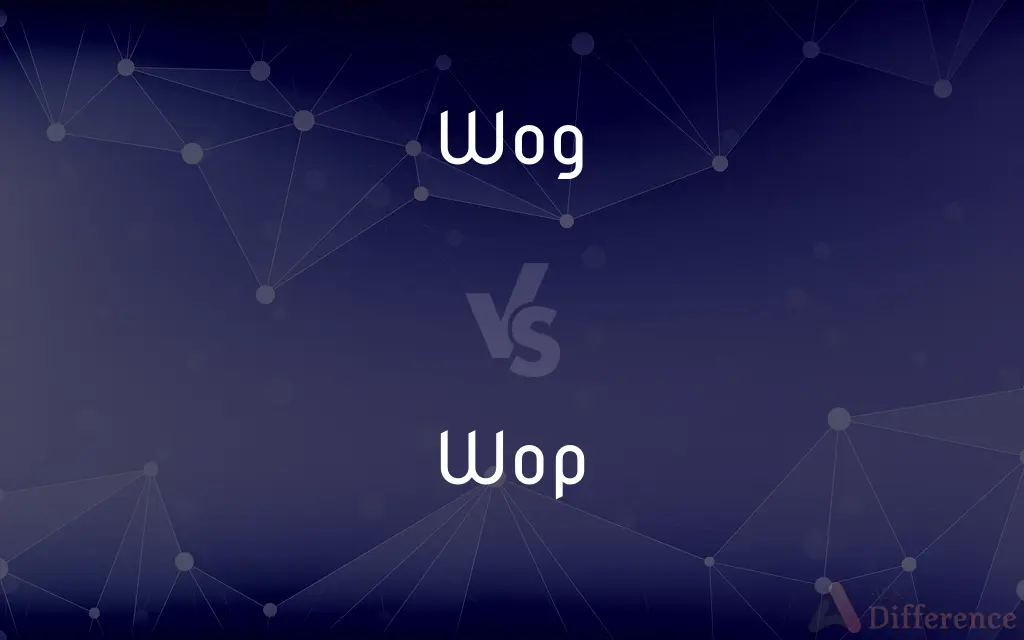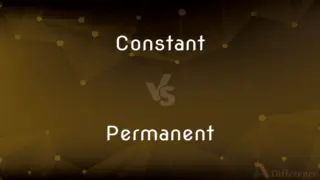Wog vs. Wop — What's the Difference?
By Urooj Arif & Maham Liaqat — Updated on May 1, 2024
"Wog" and "wop" are both derogatory terms used to disparage certain ethnic groups, with "wog" primarily targeting people of Middle Eastern, South Asian, or African descent, while "wop" is specifically used against Italians.

Difference Between Wog and Wop
Table of Contents
ADVERTISEMENT
Key Differences
"Wog" is a pejorative term historically used in the UK and Australia to refer to individuals from Middle Eastern, South Asian, or African descent. It often carries implications of foreignness and otherness. Whereas, "wop" is an ethnic slur used predominantly in the United States to demean Italians, originating from a Southern Italian dialect word meaning ‘guappo’, roughly akin to thug or swaggerer.
In usage, "wog" initially appeared in the early 20th century and was used extensively in the UK to describe non-European immigrants, particularly those from former colonies. On the other hand, "wop" entered American English in the late 19th and early 20th centuries, amid large-scale Italian immigration to the United States, and was used to stereotype Italian immigrants as lower-class and criminal.
The cultural impact of "wog" has been significant in countries like Australia, where it has been used derogatorily but also reappropriated by some communities as a term of self-identification. Conversely, "wop" has remained mostly derogatory with little to no positive reclamation by Italian communities.
Social acceptability of both terms is low, with their use discouraged in formal and polite conversation due to their offensive nature. However, the historical and social contexts of "wog" and "wop" have led to varied levels of sensitivity; "wog" might sometimes appear in colloquial or cultural contexts among reappropriating communities.
Both "wog" and "wop" serve as examples of how language evolves and reflects social attitudes. While both are derogatory, their continued use or rejection in society underscores ongoing issues of race, immigration, and identity.
ADVERTISEMENT
Comparison Chart
Targeted Ethnicity
Middle Eastern, South Asian, African
Italian
Origin of Term
UK and Australia
United States
Context of Use
Derogatory, sometimes reappropriated
Derogatory, little reappropriation
Historical Period
Early 20th century
Late 19th to early 20th century
Social Perception
Often seen as offensive
Generally considered offensive
Compare with Definitions
Wog
A derogatory term used against people not of European descent, particularly from the Middle East, South Asia, or Africa.
He encountered the word wog as an insult for the first time at school.
Wop
An ethnic slur originating from a Southern Italian word meaning ‘thug’.
His great-grandparents were often subjected to the slur wop when they immigrated to America.
Wog
An offensive slang for immigrants or foreigners.
The term wog is considered highly inappropriate in modern discourse.
Wop
Used to stereotype Italians as lower-class or criminal.
The term wop has a historical association with negative stereotypes.
Wog
Historically, a term used in derogatory jest by some communities.
He heard the word wog being used in an old movie set in the 1940s.
Wop
A derogatory term specifically used against Italians.
The word wop was spray-painted on the wall, which was quickly removed.
Wog
In some contexts, reappropriated as a self-identifier by some ethnic groups.
Some communities have tried to reclaim the term wog with a sense of pride.
Wop
Considered offensive and inappropriate in modern usage.
Educated people understand that calling someone a wop is unacceptable.
Wog
Used pejoratively to describe non-white, especially dark-skinned people.
The older literature contained the word wog which reflected the racial prejudices of the time.
Wop
Reflects anti-Italian sentiment prevalent during the early 20th century.
Wop was a common insult used during periods of high Italian immigration.
Wog
Wog is an offensive and derogatory term in Australian English and British English usually applied to people from the Mediterranean region and Middle East, such as Southern Europeans and North Africans. In British English, it may also sometimes apply to people from the Indian subcontinent and certain other parts of Asia, such as the East Indies.
Wop
Wop is a pejorative slur for Italians or people of Italian descent.
Wog
Used as a disparaging term for a person of color, especially a person from northern Africa or western or southern Asia.
Wop
Used as a disparaging term for a person of Italian birth or ancestry.
Wog
Any person who looks in-between "white" and "black": originally specifically an Indian, but later also broadened to anybody of Middle Eastern or Mediterranean descent.
Wop
A person of Italian descent.
Wog
Specifically someone of Mediterranean descent; the word does not really have an "Indian" connotation in Australia.
Wop
Offensive terms for a person of Italian descent
Wog
Abbreviation of polliwog
Wog
A pollywog, or sailor who has never crossed the Equator.
Wog
A bug, an insect.
Wog
A minor illness caused by bacteria, virus, intestinal parasite, etc.
Wog
A toy insect in parts that can be assembled, used in fund-raising games.
Wog
(Scientology) A person who is not a Scientologist.
Wog
(Of soldiers stationed abroad) to sell something, especially illicit or stolen goods, to the local inhabitants.
Wog
To steal.
Wog
An offensive slang term used by the British to refer to people of color from Africa or Asia
Common Curiosities
What does "wog" mean?
"Wog" is a derogatory term used to describe people primarily of Middle Eastern, South Asian, or African descent, often implying foreignness or otherness.
Why is "wop" considered offensive?
"Wop" is considered offensive because it stereotypes Italians as lower-class and criminal, rooted in historic prejudices and discrimination.
Are there legal ramifications for using terms like "wog" or "wop"?
While not illegal, using terms like "wog" or "wop" can lead to social condemnation, and in some contexts, such as the workplace, it may lead to sanctions or accusations of harassment.
What is the origin of the term "wop"?
"Wop" comes from the Southern Italian dialect word "guappo," meaning thug or swaggerer, and was used derogatorily in the U.S. against Italian immigrants.
How do immigrants respond to derogatory terms like "wog" or "wop"?
Responses vary; some may feel hurt or insulted, while others might ignore or confront such usage, and a few might reclaim these words in an effort to reduce their sting.
Can "wog" ever be used positively?
In some communities, "wog" has been reappropriated as a self-identifier with a sense of pride, though it is generally seen as derogatory.
What should someone do if they are called "wog" or "wop"?
Responses can vary from addressing the insult directly, seeking support, or educating the offender about the term's impact, depending on the situation and individual comfort.
How have societal attitudes towards slurs like "wog" and "wop" changed over time?
Societal attitudes have become increasingly sensitive to the use of ethnic slurs, recognizing their harmful impacts and advocating for more respectful language.
Is it acceptable to use "wop" in historical or educational contexts?
In historical or educational contexts, such terms can be used critically to understand their impact and evolution, but should still be approached with caution and context.
What impact do slurs like "wog" and "wop" have on community cohesion?
Such slurs can significantly damage community cohesion by promoting division and reinforcing stereotypes and prejudices.
How does the media influence the perception of terms like "wog" and "wop"?
The media plays a crucial role in either perpetuating derogatory stereotypes associated with these terms or educating the public about their offensive nature and promoting more respectful language.
Can literature and art play a role in addressing the use of slurs like "wog" and "wop"?
Yes, literature and art can critically examine these slurs, their origins, and impacts, contributing to broader discussions on racism and cultural sensitivity.
How does understanding the history of slurs like "wog" and "wop" help combat their usage?
Understanding the history helps to contextualize why these words are offensive and educates people on the importance of respectful and inclusive language, thereby reducing their casual or malicious use.
Why is the reappropriation of slurs like "wog" complex?
Reappropriation can be complex because it involves turning a negative term into a positive or neutral one, which not all members of the targeted group may accept or support.
What are the cultural implications of using "wop" in contemporary society?
Using "wop" in contemporary society can perpetuate outdated and harmful stereotypes, which can hinder cultural understanding and acceptance.
Share Your Discovery

Previous Comparison
Cockerel vs. Pullet
Next Comparison
Constant vs. PermanentAuthor Spotlight
Written by
Urooj ArifUrooj is a skilled content writer at Ask Difference, known for her exceptional ability to simplify complex topics into engaging and informative content. With a passion for research and a flair for clear, concise writing, she consistently delivers articles that resonate with our diverse audience.
Co-written by
Maham Liaqat












































